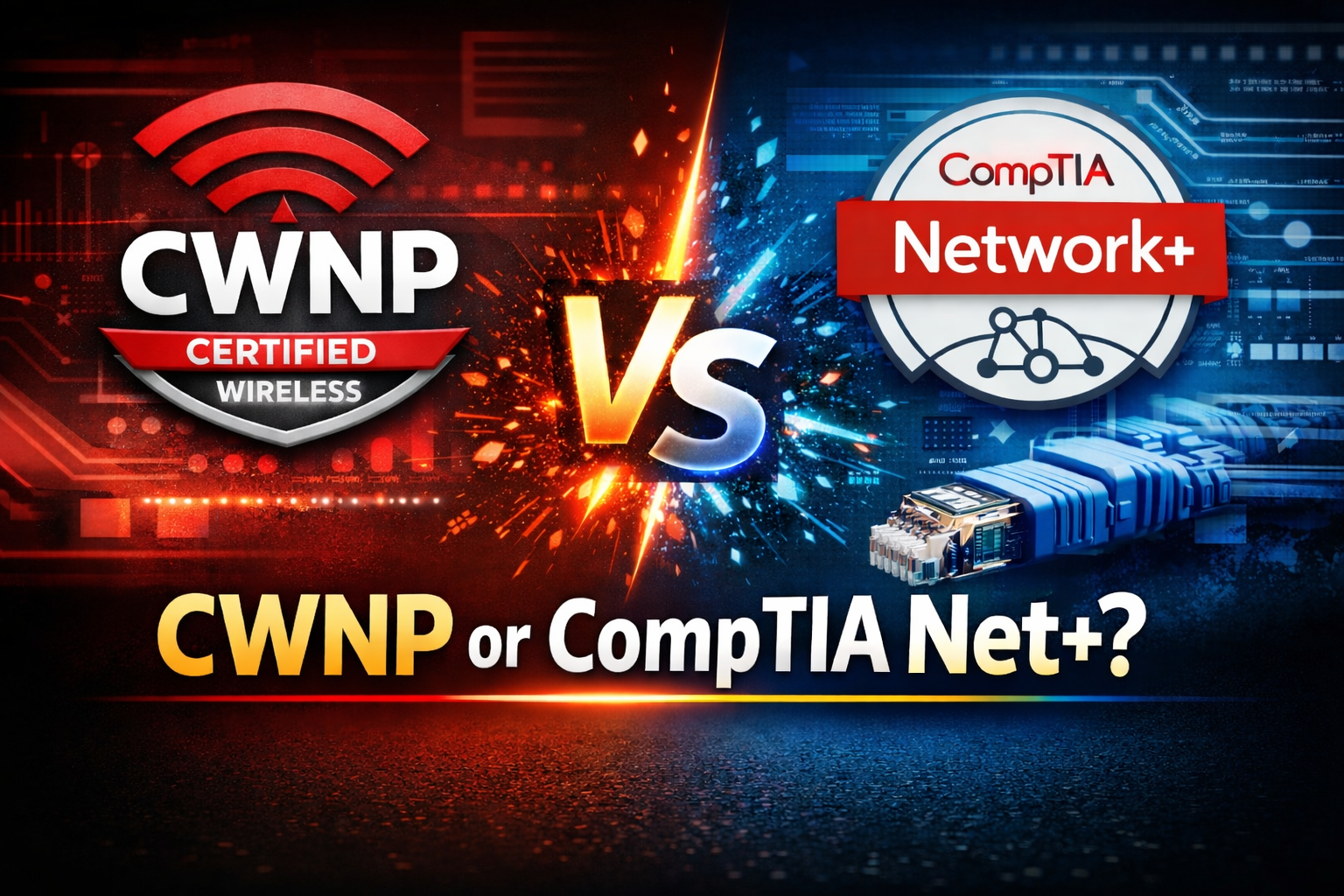The Benefits of a Cisco CCNA Certification
The Benefits of a Cisco CCNA Certification
What is a certification? According to the ISO, a certification is “the provision by an independent body of written assurance (a certificate) that the product, service, or system in question meets specific requirements”. In other words, it is independent verification that someone or something can do the job it purports to be able to do.
When talking about our careers in technology, there are a plethora of IT industry certifications to choose from, and selecting the one that is going to give the most value for money is a hard choice for many people.
Why is the Cisco CCNA certification the best choice for me?
A common question frequently asked is “Which is the best IT certification for me?” The simple answer is, “It depends”.
There are many factors to think about. Firstly, it depends on your level of experience. Secondly, it depends on your available budget: is your employer paying for it, or do you have to pay for it out of your own pocket? Thirdly, it depends on your goals: what is your goal and how will the certification you are seeking help you to achieve it? And fourth, it depends on the value (recognizability) of the certification itself. There really are quite a number of considerations to weigh up for what is, superficially, a simple question.
Let’s explore each of these options one at a time.
What is your level of experience in IT certifications?
To determine your best path forward, you need to think about your current level of experience. If you have a lot of experience, you may be able to jump over some of the basic certifications or, perhaps, you might want to think about sitting the exams because they should be “easy wins”.
Conversely, you may want to take a look at yourself and think about the answer to the following questions: are you new to the IT industry? If so, an entry-level certification may suit you the best. If you have 1-3 years’ experience, then an Associate level certification might be your preferred option. If you have 3-5 years’ experience, then you can look at Professional level certifications and, with more than 5 years’ experience, you might want to investigate the realm of Expert level certifications.
What is your budget when considering IT certifications?
The second consideration is cost. If your employer is paying, then the determination of which certification you should take may rest solely on their budget and their list of approved certifications. If you are paying, then you will probably be motivated by obtaining the absolute best value for your money. We will come back to this later.
What benefit is the IT certification going to give you?
The third thing to think about is why you want a certification. Some people are in the enviable position of being able to study for fun. They don’t need certifications, but they love to learn and so pursue continuing education and certifications as a past-time. Some may just enjoy collecting acronyms for their resume! Others pursue them for a practical purpose.
From a practical perspective, you may want to consider the following questions when determining whether to obtain certifications, and which ones to pursue: has it become a requirement for your current job? Do you need it/them to officially prove your level of competence? Is the need to strengthen your resume to help you obtain more responsibility at work or a promotion?
Will the industry recognize my IT certification?
This fourth consideration is quite important. Many employers want their engineers to hold recognizable industry certifications for a number of reasons including:
- being able to hold their team out to the public as being competent – using these recognizable certifications as the standard, helps provide customers with a level of confidence in your company,
- to bring greater ROI to purchased equipment – for example, as in the case of Cisco training, engineers are taught to identify and utilize features of products that, otherwise, may go unrecognized and unused,
- to provide better value for users of their internal and external networks, and to reduce downtime, by being able to troubleshoot and resolve issues in real time,
- added security. Trained engineers tend to be more security conscious than engineers who have merely “picked up knowledge along the way”. Formal training usually includes some level of focus on aspects of physical and cyber security.
The clear winner is Cisco's CCNA certification
This is where Cisco’s CCNA certification comes into its own. The certification is targeted at engineers with more than one year of experience but is broad and high-level enough to be of great value to fairly new engineers. It has the ability to provide a flavor of the many aspects of IT networking, one of which may appeal to the student as the avenue they wish to further explore. Cisco’s CCNA certification training addresses a multitude of topics including, among others: routing and switching, wireless, cloud, collaboration, data center, and security.
Cost considerations
Additionally, the cost for Cisco certifications is not prohibitive. Yes, of course there are cheaper alternatives, but as the old adage goes “You get what you pay for”. Considering the fact that Cisco is a globally-recognized brand name, you will be obtaining a recognizable – and therefore useful-to-your-IT-career – certification.
Ranking from most to least expensive the student has a choice of in-person or virtual instructor-led training, or they can pursue the subject using an official self-study course. Whether you decide on Cisco’s official instructor-led training, or opt for the self-study* package, you will be provided with reading material and a hands-on lab experience which, together, provide you with a comprehensive and structured study program thus giving you the best chance of success in the certification exam.
The added benefit of having a live instructor is that of being able to ask questions to clarify some of the confusing concepts: a resource which, for self-study, you won’t have.
Cisco certifications grow with you
The great thing about Cisco certifications is that they are structured to certify knowledge at ever-increasing levels of competence. As you progress in your career and seek increased levels of responsibility, Cisco certifications grow with you and can prove technical competence at those higher levels. But, unquestionably, the best place to start your journey is with the Cisco-Certified Network Administrator or CCNA certification, which gives you the firmest foundation upon which to build your future knowledge.
To see Cisco’s career path roadmap, and see what is possible, click here.
The Cisco CCNA certification is globally recognized
The most important aspect of Cisco certifications – especially the CCNA certification – is their recognizability. Of all the major technology companies in the world Cisco is one of the most recognizable. With its San Francisco Bridge shaped logo there can be little doubt as to the company’s origin. In the United States, federal, state, and city governments, along with various military and education departments, and healthcare companies, to name but a few, use Cisco technologies. The company has worldwide reach and all its customers recognize the skills needed to achieve a Cisco certification.
Whichever way, and for whatever reason, you decide to train for and achieve your Cisco CCNA Certification - it will likely be worth it!
For information on all the NC-Expert training classes for Cisco - check here.
Learn more about the Cisco CCNA Certification and other IT Certification training provided by NC-Expert here.
*With Cisco’s official self-study package, the student is presented with a limited series of explanatory videos instead of live instructor-led training. The other materials and labs are, essentially, the same as the products available in-class/virtually. The major drawback with self-study is that you will not have access to a highly experienced mentor who can immediately answer your questions. In that respect, you are on your own.
NC-Expert Blog





